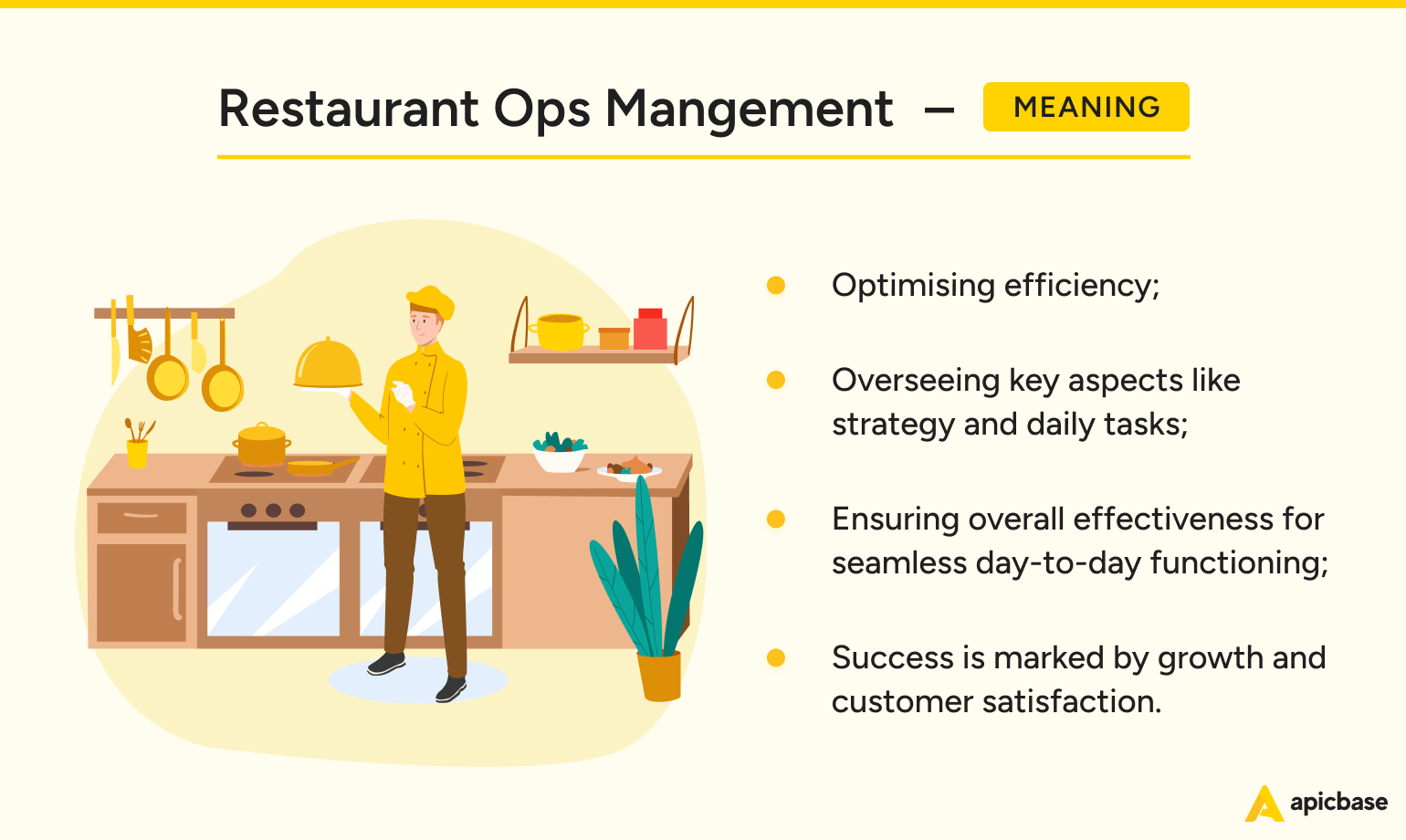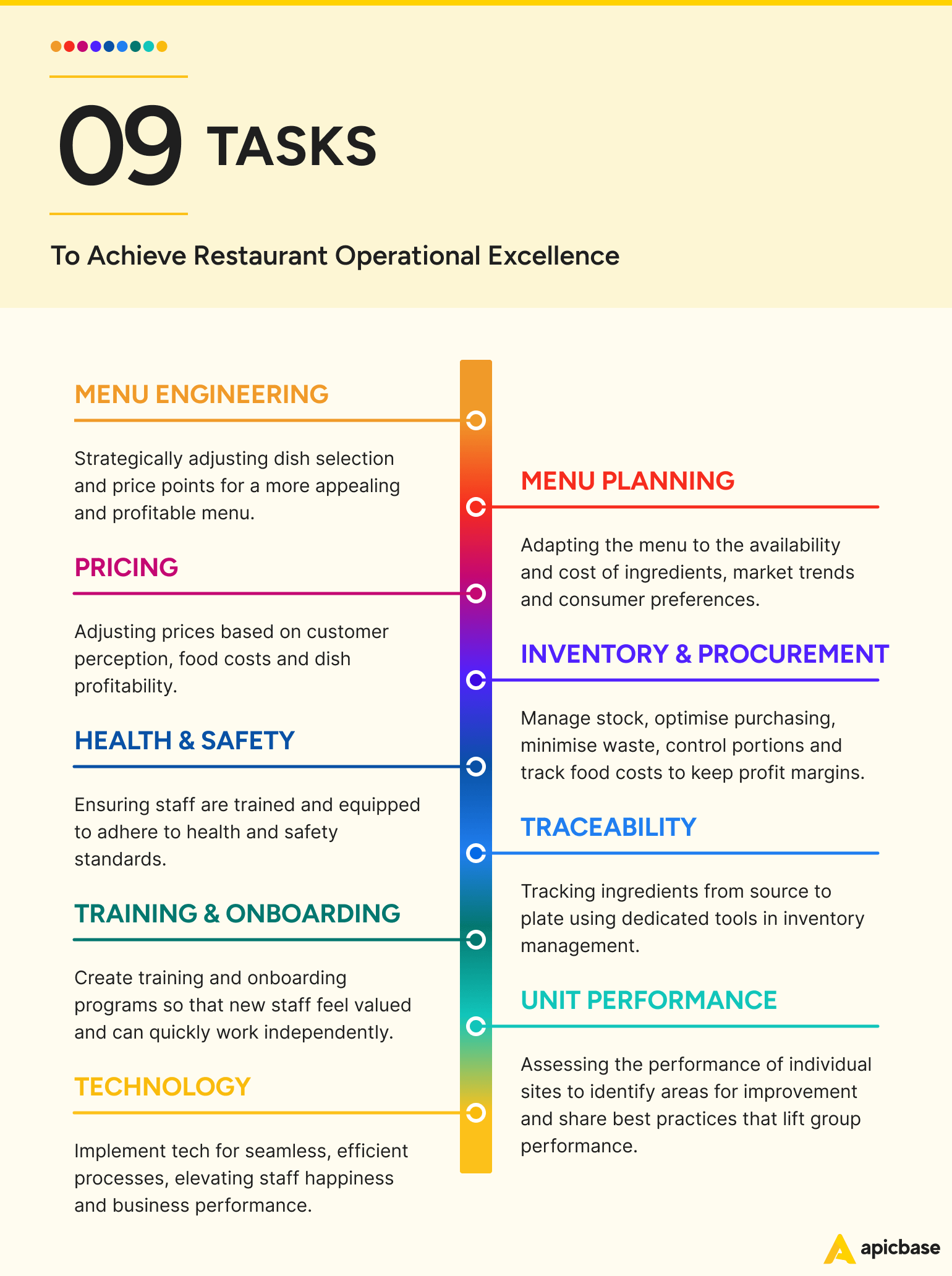Success for a waiter is in providing everything the customer needs while they barely notice what you are doing.
Similarly, restaurant operations management is about seamlessly making the whole operation work: facilitating an excellent customer experience, giving staff everything they need to do their jobs, and making the restaurant run smoothly and efficiently.
Read on to discover:
- What restaurant management is;
- What it entails day-to-day;
- Examples of efficient restaurant operations management at three successful restaurant brands.
What Is Restaurant Operations Management?

First, let’s look at the definition of restaurant operations management. It is the systematic supervision and coordination of various activities within a restaurant to ensure optimal performance.
Restaurant operations management is about making sure everything in a restaurant works together smoothly to deliver great service, tasty food, and keep everyone happy, from the guests to the staff.
It covers everything from managing the team and overseeing how meals are prepared and served, to making sure the place meets health and safety rules, keeping an eye on the money and supplies, and thinking of ways to make the experience better for customers and help the business grow.
In short, restaurant operations management is all about keeping the restaurant running well, making sure customers leave happy, and ensuring the business stays in good shape financially.
From the bustling kitchen to the welcoming front-of-house, this discipline centres on:
- streamlining processes,
- enhancing efficiency, and
- ultimately delivering a seamless dining experience.
A successful restaurant operations manager needs to consider the big-picture strategy and oversee the completion of numerous smaller daily tasks.
This strategic orchestration extends to menu planning, pricing, inventory management, health and safety protocols, and the testing and implementation of new technology.
Solid restaurant operations management ensures smooth day-to-day functioning and lays the foundation for growth and customer satisfaction.
Ultimately, success in restaurant operations management not only ensures smooth day-to-day functioning but also lays the foundation for sustained growth and customer satisfaction.
What Does Restaurant Operations Management Entail?
Effective restaurant operations management involves taking care of everything a restaurant needs to thrive from day-to-day and excel in the future.
Let’s break down the core tasks needed to achieve restaurant operational excellence.

Menu Engineering
Menu engineering is the practice of strategically crafting and optimising your menu to maximise profitability and customer satisfaction.
The process requires accurate and up-to-date sales figures, food costing, and inventory data to make the necessary calculations.
Developing new products and adapting existing dishes to improve your menu involves critically evaluating the profit margins, popularity, and cost-effectiveness of each dish and working to optimise your menu based on your findings. That could mean dropping dishes, adding new items, or changing prices. Whatever it takes to make your menu more appealing and more profitable.
Menu Planning
Menu planning is an ongoing process that ideally considers seasonal changes in ingredient availability and cost, market trends, and changing consumer preferences.
Thoughtful tweaking and adapting of menus can increase profitability and assist with brand reputation. The execution of the practical steps to do this fall to restaurant operations management.
Pricing
It’s up to the operations management team to monitor consumer pricing perception, food costs, and dish profitability to determine the optimal pricing strategy for the menu.
This is a tricky balance to strike, especially amid rising food costs and uncertainty. Therefore, it is vital to continually monitor trends, ingredient prices, and sales figures and make strategic pricing decisions to maximise profit margins.
Inventory Management and Procurement
Inventory management and purchasing are key duties for a restaurant operations manager to oversee. Keeping on top of food cost calculations and managing stock levels effectively drives profitability and keeps your chefs happy with the tools they need to perform at their best.
Inventory management and procurement are complex tasks that involve:
- Efficiently managing stock
- Controlling inventory levels
- Minimising waste
- Calculating food costs
Forward-thinking restaurant brands tend to use some form of restaurant inventory management software with tools to keep track of all these moving parts and automate much of the heavy lifting.
Health and Safety Management
Keeping up to date with the latest health and food safety laws and guidelines is vital as a restaurant operations manager. It is the operations department’s responsibility to ensure staff are trained and equipped with everything they need to implement best practices and adhere to health and safety standards to safeguard both customers and staff.
Traceability Management
Keeping an eye on the entire supply chain ensures the traceability of ingredients from source to plate for quality control and compliance. Without this transparency with suppliers and producers, your restaurant brand is at a higher risk of falling prey to a foodborne illness crisis.
Food traceability tools integrated with your inventory management system are the best way to keep track of ingredients throughout the supply chain and ensure you can track any problems back to the source.
Training and Onboarding
Proper training is crucial, especially in larger organisations where staff need to be able to make decisions autonomously. That’s why it’s vital to develop comprehensive training programs for staff to uphold service standards and operational protocols.
Operations managers are also in charge of building onboarding programs for new team members to quickly get up to speed and feel welcome in the company. This is another key aspect of the overall training strategy for a multi-unit restaurant company.
Monitoring Unit Performance
Using restaurant data, sales numbers, and food costing calculations, among many other variables, restaurant operations management should regularly assess the performance of individual locations to identify areas for improvement.
Top-performing locations set the benchmark to which you aim to raise the underperforming restaurants. Having a comprehensive restaurant management system in place is the most efficient way to get accurate, comparable data from every location. It also helps communicate effectively between stores to share best practices and improve overall performance.
Technology Implementation
Operations managers need to stay abreast of the latest technologies that could improve efficiency or give the company an edge against the competition.
An important part of the job is trialling new systems and deciding whether they will bring enough value to the business.
When using technology to manage different business areas, the restaurant software must integrate. Your systems should be able to talk to each other and share data efficiently and accurately.
Leveraging technology solutions where they are deemed appropriate allows you to streamline processes, all the way from reservations to order management software, restaurant POS systems to ticket printers, and payroll automation to inventory management tools.
Examples of Successful Restaurant Operations Management
Now we’ve seen what restaurant operations management involves, let’s have a look at some concrete examples of operational success.
The three examples below show how improving a restaurant’s operational management processes can lead to a range of positive outcomes, from helping a chain grow sustainably to maintaining consistency across sites to providing a stable platform to oversee and encourage the growth of a franchise operation.
Rapid Expansion
Poule & Poulette quickly evolved from a food truck to a burgeoning 10-restaurant chain, a testament to rigorous planning and foresight.

COO Filip Van Hoeck realised the importance of having robust systems in place to be able to manage operations centrally before rapid expansion.
With a central kitchen producing food for multiple sites, Poule & Poulette adopted Apicbase to centralise all its data and ensure smooth communication between locations. The system empowered its restaurant managers with tools to automate tasks and manage efficient day-to-day operations.
The system enhances control, facilitating regular audits, error detection, and process improvements. Integrating seamlessly with Lightspeed POS, Apicbase provides real-time insights for informed decision-making.
Poule & Poulette’s journey shows how successful restaurant operations management is the linchpin for sustained growth and efficiency for new and established restaurant brands.
Ensuring Consistency
The Avocado Show, which found fame online with its Instagram-worthy avocado-based dishes, is not just a social media sensation but a rapidly expanding culinary empire. As the brand started to proliferate across European cities through both owned and franchised locations, the challenges of maintaining consistency and profitability became all too apparent.

Facing the complexities of inventory management, Jay Greenslade, Franchise Operations Manager, addressed crucial issues to align actual costs with theoretical costs. This involved preventing excess purchases and production, as well as streamlining operations for both headquarters and on-site teams.
Key to the brand’s success was finding software that seamlessly integrated with the POS system. Apicbase emerged as the solution, ensuring every sale automatically updates raw material stock levels, minimising errors in purchase orders.
Jay reveals that improved operations management helped The Avocado Show achieve better consistency across outlets and countries, increased profitability through better inventory management, and improved efficiency through centralised management.
Franchise Oversight and Growth
In response to the UK’s calorie labelling legislation, Chris Conaghan, Business & Operational Development Manager at Heavenly Desserts, sought a solution that not only addressed compliance but also streamlined various aspects of restaurant operations.

Heavenly Desserts relied heavily on spreadsheets and emails, leading to inconsistencies in data updates, especially with menu changes or ingredient adjustments. Compliance with new rules for displaying calorie information posed complexities that required precise data management across all locations.
The lack of a unified system, with area managers unable to be present at all locations simultaneously, meant real-time performance data for each store became essential.
Additionally, ensuring franchise partners adhered to guidelines proved challenging with incomplete spreadsheets and no central knowledge base.
After implementing a centralised operations management system using Apicbase, Heavenly Desserts manages costing and calorie labelling centrally, improving consistency and accountability across the business.

A Platform for Multi-Unit Operations
For multi-unit restaurant chains, consolidating operations on a single platform is imperative. A unified platform streamlines processes, enhances communication, and provides real-time insights, ensuring seamless operations across locations.
Restaurant chains across Europe and the world are using Apicbase as their centre of operations.
Apicbase houses their operational data, automates tasks, and provides a platform for smooth communication across the business.




